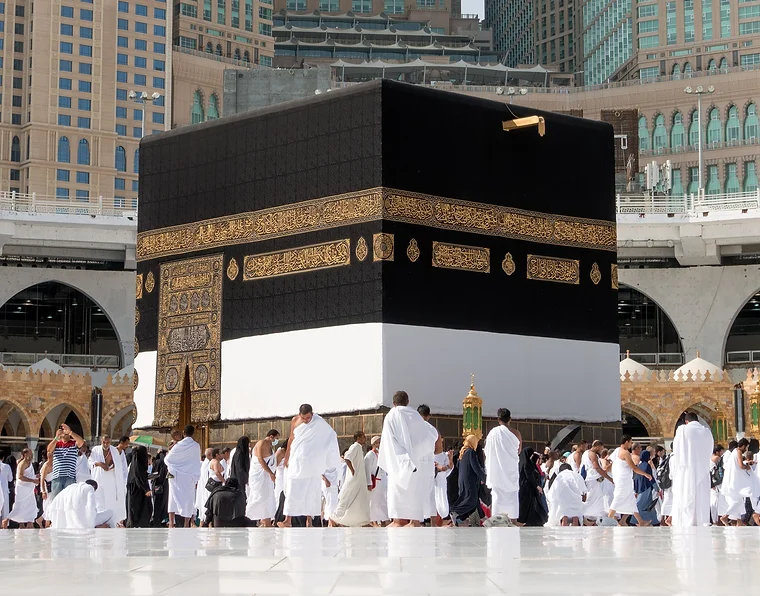
The Reward of a Journey of a Lifetime
So why is it that approximately 4-5 million people will come from every corner of the globe, by plane, by bus or by foot and fulfill the fifth Pillar of their faith?
What drives them? What’s the end goal?
Whilst there are many benefits, the single greatest goal of all the pilgrims if they have an ‘accepted’ Hajj is that the reward is guaranteed entry into none other than paradise! What a reward! What a goal!
It was narrated that Abu Hurayrah (may Allah be pleased with him) said:
Narrated by al-Bukhaari, 1449; Muslim, 1350.
“I heard the Prophet (blessings and peace of Allah be upon him) say: “Whoever performs Hajj for the sake of Allah and does not utter any obscene speech or do any evil deed, will go back (free of sin) as his mother bore him.”
(Bukhari and Muslim)
“From one ‘Umrah to another is expiation for what is between them and Hajj Mabrur has no reward except Paradise.”
By Hajj Mabrur it means the Hajj accepted by Allah (swt) for being performed perfectly according to the Prophet’s (s.a.w) Sunnah with legally earned money avoiding sinful and evil deeds during Hajj (see the seven conditions of an accepted Hajj).
This is the ultimate goal in our purpose of existence!
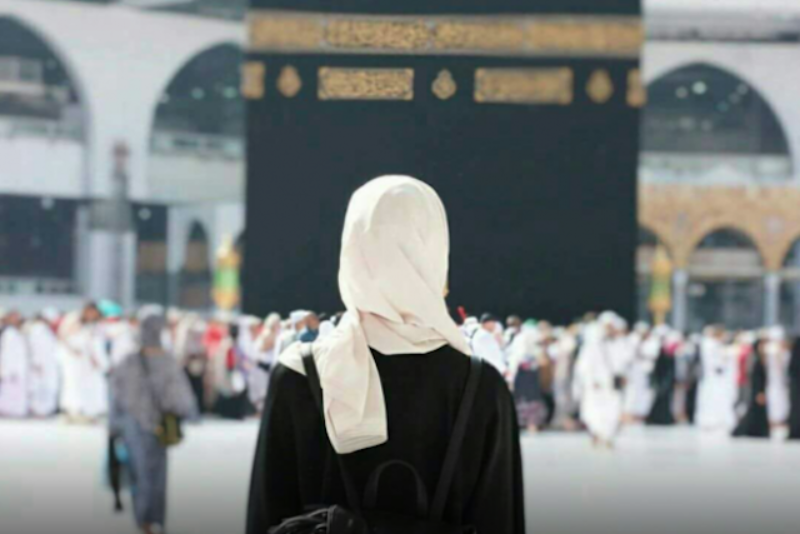
A Woman’s Jihad
For a Woman, Hajj is the biggest struggle or form of Jihad that they can perform in their life time. Having been blessed with the ability to perform Hajj for the last four years I can understand why this is the case as it can be very difficult for the women. Every year that I come I always see that the women of the group have so much hunger to make the most of the trip and form a special bond between all of themselves so quickly. They strive and compete and encourage each other to do good. I am proud to have them as sisters in faith.
(Bukhari Vol. 4, Hadith 43)
Aishah (r.a., radhiallahu anhu, meaning: may Allah be pleased with her) narrated that she said,
“O Allah’s Messenger! We consider Jihad as the best deed. Should we not fight in Allah’s cause?” He said, “The best Jihad (for women) is Hajj-mabrur (i.e. Hajj which is done according to the Prophet’s tradition and is accepted by Allah).”
The amazing story of Asma’ bint `Umays – the wife of Abu Bakr (the truthful one) the greatest companion of the beloved Prophet peace be upon him.
Asma was full term in her pregnancy i.e. 9 months pregnant and she set out to do Hajj and while doing so, gave birth to a son only 10 kilometers or so into their journey. She did not let this stop her and had a bath and continued on via camel in the desert in the Arabian sun to travel 500 kilometers to Makkah all whilst taking care of the newborn. She was so eager and keen to perform Hajj with the Prophet (s.a.w) and what a choice it was as the Prophet (s.a.w) only performed Hajj once as he died before the Hajj next year! An amazing story of an amazing woman! Even today in air-conditioned buses, 5 star hotels I don’t think there would be many if any women who would do the same thing!
After hearing this story, I had to reflect back to when I came in 2010 with my wife who was four months pregnant. I didn’t really pay too much attention at the time nor ever since but I have to say that it was an amazing effort on her behalf to complete Hajj whilst bearing my son four months pregnant. Women in general, they always put us men to shame!
I pray that all the sisters from around the world who have come to perform their biggest Jihad of Hajj have a safe, healthy and accepted pilgrimage.
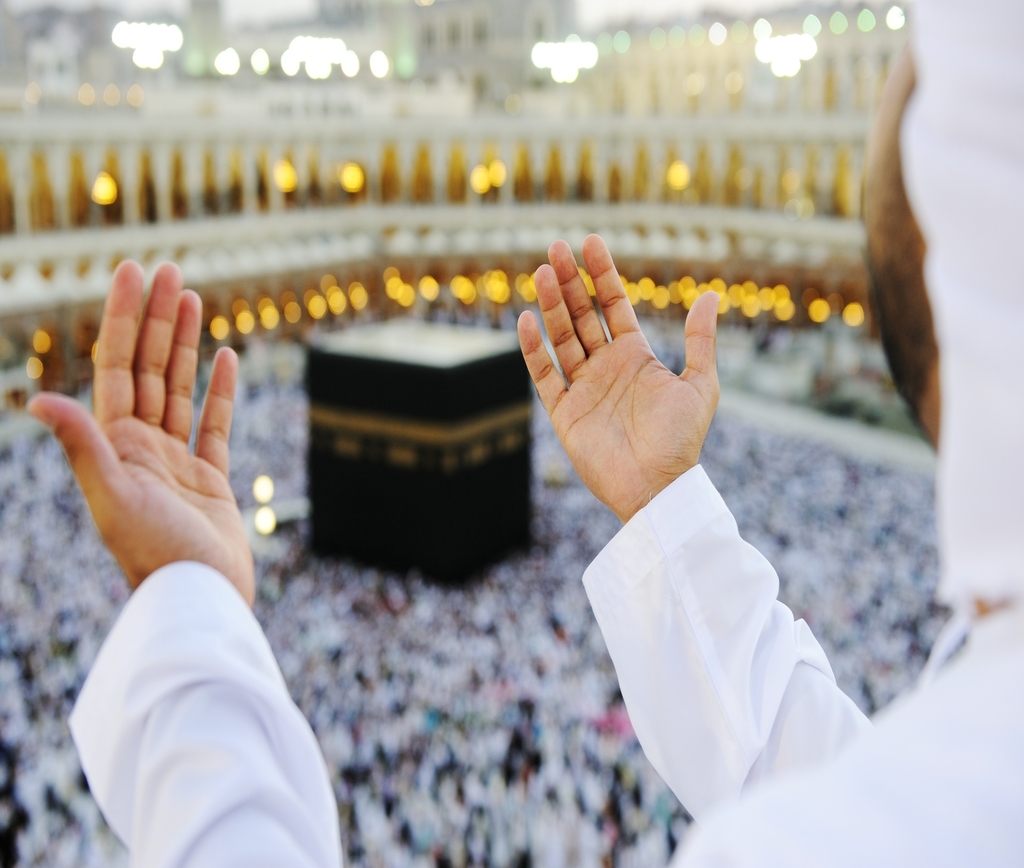
Umrah
There are Three pillars of Umrah:
- Having the intention to perform it.
- Performing Tawaaf (seven circuits anticlockwise around the Ka’aba).
- Performing Sa’ee- Walking with a small sprint between the mountains of Safa and Marwa seven times.
There are two obligations of Umrah:
- Entering the state of ‘Ihram’ at the Meeqat (valley of Dhull Hulayfah for those performing Umrah from Medinah and from the designated place of the plane to Jeddah, if you are heading directly to Meccah first and performing Umrah).
- Cutting the hair.
To enter into the state of ‘Ihram’ we have to clean ourselves, shower, remove hair from arms and private areas, and cut our nails. This is so that we are in the purest of states for the Almighty.
Once entered into Ihram there are nine prohibitions:
- Men are not allowed to wear fitted clothing.
- Not allowed to wear perfume during the state of Ihram.
- Men are not allowed to have anything on their head, hat etc.
- Can’t cut nails.
- Can’t intentionally cut, pluck etc any hair on the body.
- Not allowed to hunt or kill animals unless its harmful, snake, scorpion, rat, dog, lion etc.
- Not allowed to get engaged.
- Not allowed to make a marriage contract.
- Not allowed to have sexual intercourse, or anything leading to, it romantic talk etc.
The first condition of not wearing fitted clothing for the men, means we wear two pieces of cloth only. An upper one and lower one, that’s it!
The secret to putting the lower half of the Ihram on is to bend the knees, stand shoulder width apart and wrap it like a serong. You don’t necessarily need a belt, but it is useful if you want to put your money, phone etc in it.
Now the purpose of the Ihram clothing is to humble us and also to remind us of death, as the cloth we are shrouded with when we are buried is similar to that of the Ihram.
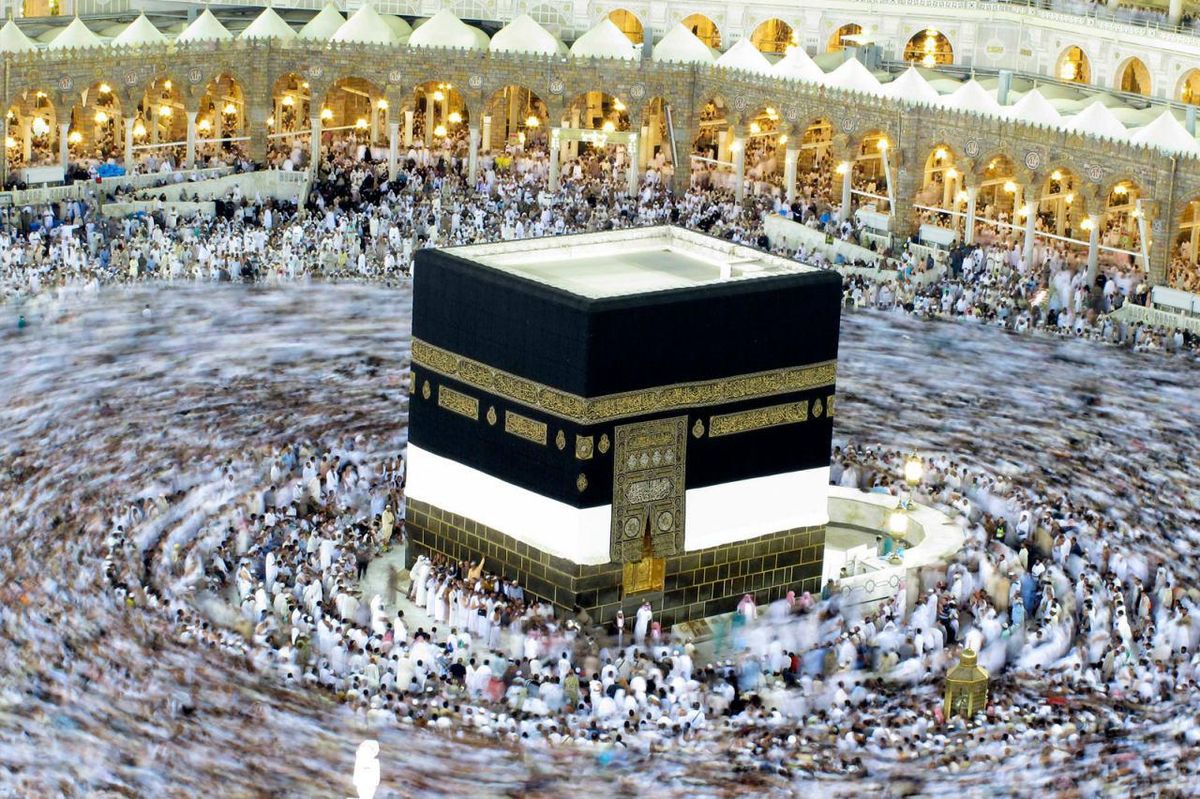
Tawaaf
- One must be in the state of wudhu.
- Pronouncing the Talbiyah is concluded right before commencing Tawaaf.
- The niyah for Tawaaf (and for Sa’ee) is in the heart and not uttered.
- It is Sunnah for men to expose their right shoulder from the beginning of the Tawaaf to the end. This is the only time throughout the Umrah that one should leave his right shoulder uncovered. At the end of the last circuit one should cover both shoulders.
- Start the Tawaaf by proceeding to the Black Stone (Hajr-al-Aswad):
- Kiss it if possible;
- If not, touch it with your right hand (Istilam) and kiss your hand;
- If this is not possible, then face the Black Stone and with your right-hand gesture towards it only ONCE (DO NOT kiss your hand);
- Say once only:
بِسْمِ اللهِ وَ اللهُ أَكْبَرُ
“Bismillahi wallahu Akbar”
In the Name of Allah, Allah is Greater
- It is important to note that if one is unable to reach the Black Stone, one’s Umrah is not decreased in merit in any way, but if one pushes and shoves his Muslim brethren in order to do so, he risks incurring Allah (swt) the Almighty’s displeasure.
- It is commendable for the men to raml (walk briskly) in first three circuits around the Ka’bah and then walk normally in the remaining four. This should not be done if one cannot avoid disturbing others or risk losing in the crowd any women that are with you. Point 4 and this point do not apply for Tawaaf-al-Ifadah or Nafl tawaaf.
- Proceed in anti-clockwise direction, making dhikr, reciting Quran, supplicating etc.
- Walk around the Hijr area, not through it.
- Once you reach the Rukn-al-Yamani (the southern corner) touch it with your right hand (Istilam) and say اللهُ أَكْبَرُ(Allahu Akbar). Do NOT kiss it. If you are unable to touch it, do not gesture towards it, but proceed towards the Hajr-al-Aswad, without saying اللهُ أَكْبَرُ (Allahu Akbar).
- It is Sunnah to recite the following between the Rukn-al-Yamani and the Black Stone corner (note that the dua stops at …adhaabannaar).
(Surah al-Baqarah, part of ayah 201)
رَبَّنَا آتِنَا فِي الدُّنْيَا حَسَنَيهةً وَ فِي الآخِرَةِ حَسَنَةً وَ قِنَا عَذَابَ النَّارِ
“Rabbanaa aatina fidunya hasanah wa fil aakhirati hasanah wa qinaa adhaabanaar”
Oh Allah, give us the good of this world and the good of the Hereafter and protect us from the punishment of Hellfire.
- Once you reach the Hajr-al-Aswad again you have completed one circuit.
- Continue by once again either kissing, touching or gesturing towards the Black Stone and say only:
بِسْمِ اللهِ وَ اللهُ أَكْبَرُ
“Bismillahi wallahu Akbar”
In the Name of Allah, Allah is Greater
- Proceed and repeat the aforementioned steps until you have completed seven circuits.
- Upon completion of the Tawaaf, proceed to the Maqaam Ibraheem or any place in the mosque if this area is too crowded.
- It is commendable to say:
وَ اتَّخِذُوا مِنْ مَقَامِ إِبْرَاهِيمَ مُصَلَّى
“Wattakhidhu min Maqaami Ibraheema musalla”
And take the station of Ibraheem as a place of prayer
- Cover your right shoulder and perform two rak’at of prayer. It is acceptable to perform the two rak’at anywhere in the mosque. As with the kissing of the Black Stone, remember it is best to avoid harming and causing difficulties to fellow Muslims.
- If you are fortunate enough to perform it near the Maqaam, then stand with the Maqaam between you and the Ka’bah (if possible).
- It is Sunnah to recite Suratul-Kafirun (109) after Suratul-Fatiha in the first rakah and Suratul-Ikhlas (112), after Suratul-Fatiha in the second rakah.
- Tawaaf is now complete.
- After finishing the two rak’at, it is commendable to proceed to the well of Zam Zam (if convenient) and drink till your full.
- Then return to the Black Stone and kiss it if you are able to do so without crowding other worshippers.
- If kissing the Black Stone is not possible, then proceed to Safaa without gesturing or saying اللهُ أَكْبَرُ (Allahu Akbar).
- So in general terms performing Tawaaf means; seven circumambulations followed by two unit of Salah.
Background
One of the things that we do as part of Umrah and Hajj and also something that we cannot do anywhere else in the world but here, is the Tawaaf (seven circumambulations or laps anti clockwise around the Ka’ba followed by two units of prayer behind the station of Ibraheem and then drinking some Zam Zam water).
This action is symbolic of when Prophet Ibraheem (Abraham) and his son Ism’aeel (Ishmael) peace be upon them both were ordered by the Almighty to do this to purify the House of Allah (swt) for worship.
Normally the Tawaaf can be completed on three-four different levels. However, this can change depending on the construction and crowd management of the authorities.
The Tawaaf itself begins at the black stone corner and one lap is completed when you pass it again. Whilst you are completing the tawaaf (i.e. circumambulations) this is time that is between you and The Lord of the heavens and the earth. A time for reflection and time for prayer where you praise the Almighty as well as ask for anything that you may like.

The view from ground level while people are performing tawaaf.
One of the things that really really stirs my emotions during the tawaaf is when I ponder and reflect on those around me. I see husband and wife, I see sons holding their mums hand or a daughter holding their fathers hand. I look at the temporary ring they have put this year to accommodate wheel chairs as only the ground floor is otherwise available and see children pushing their parents in a wheel chair. I see elderly men and women who are fragile who must have waited and saved an entire lifetime to be here and I even see parents with their small infant children.
I then, ask the Most Loving, the Most Merciful and the Most Generous to forgive them and grant them goodness in this life and the next.

View from second level looking down at the Mataaf.
My attention turns to my own family. My wife and my son, my parents, siblings and extended family. I remember how a Yemeni man carried his mother on his back and performed the tawaaf so that she could complete the Hajj and then asked whether he had repaid his mother? He was told that it had not even repaid one labour pain! I then cry wishing I could be a better son to my mother, seek forgiveness for all the times I caused her grief and wish I could carry her on my back all the way from Australia just so that she could be with me right now. I pray that one day I can take my mum with me on this journey and do everything possible for her just so that I could repay her for one labour pain.
I have been stuck on this post for days as everytime I get to this part I get emotional and cannot continue.
So, what is the reward for completing tawaaf? A person gets the reward of freeing a slave. What is the reward of freeing a slave? For everybody part of a slave you free, that body part of yours is freed from the hellfire by the All Forgiving! Also, for every step you take performing tawaaf, a sin is erased and a good deed is written for you in your book of deeds. What a great reward!
So why do we go anti clockwise?
The scholars have given a couple of opinions on why this is the case. Firstly, as the Ka’ba is always on our left, this means our heart is closer as the Almighty wants our hearts to be as close as possible to Him. Secondly when the sperm of a man enters the womb it rotates in an anti clockwise direction until only one enters to create a newborn baby. What is the significance of this? The reward of an accepted Hajj is that you are like a newborn baby i.e. free of sin! All praise is due to the Creator of the Heavens and the Earth!
Best times to do Tawaaf
From experience, if you are healthy, the best times to complete tawaaf in a day are 4. When the roof is available for tawaaf then between fajr and sunrise so you get the rewards associated with that and also between maghrib and Isha as the timing between them allows you to finish exactly in time. On the roof although each lap is approximately 700 meters you can do it quite comfortably away from large crowds, spend a lot more time in remembrance and prayer and think about the reward for each step you take!!! Just watch out for the flying wheel chairs! The other two best times to do it are on the ground floor between 7:30am – 8.30am as most people are having breakfast or sleeping or approximately 45 minutes before Asr (afternoon prayer) if you can handle the heat at that time. You can do it anytime, but these are my recommendations to make the most of your time.
Lastly, most people come and get side tracked with other things in Makkah. My advice, complete as much tawaaf as you possibly can, at least a minimum of two a day. You’ll regret it if you don’t.
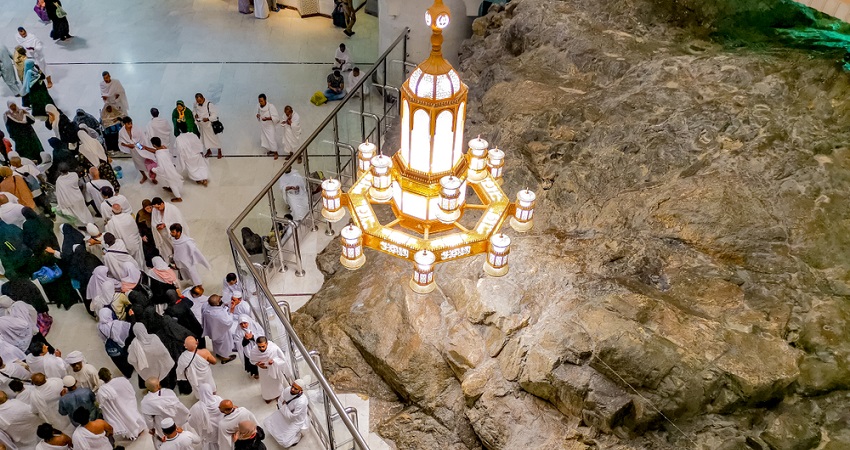
Sa'ee
- Proceed to Safaa. When you get close to Safaa it is Sunnah to say:
(Surah al-Baqarah, 158)
الصَّفَا وَالْمَرْوَةَ مِنْ شَعَائِرِ اللَّهِ فَمَنْ حَجَّ الْبَيْتَ أَوِ اعْتَمَرَ فَلاَ جُنَاحَ عَلَيْهِ أَنْ يَطَّوَّفَ بِهِمَا وَمَنْ تَطَوَّعَ خَيْرًا فَإِنَّ اللَّهَ شَاكِرٌ عَلِيمٌ) نبدأ بما بدأ الله
Innas-safaa wal marwata min sha’aa’irillaahi faman hajjal baita ‘awi’tamara falaa junaaha ‘alaihi an yattawwafa bihimaa wa man tatawwa’a khairan fa’innAllaha shaakirun ‘aleemun. Nabda’u bimaa bada’Allahu bihi
“Verily! As-Safaa and Al-Marwah are of the symbols of Allah. So it is not a sin on him who performs Hajj or Umrah of the house to perform the Tawaaf between them. And whoever does good Voluntarily, then verily, Allah is All-Recogniser, all-knower.
“We begin with what Allah began with”.
- Please note that both the above are only to be said ONCE, that is at the beginning of the Sa’ee and not at the beginning of every lap.
- When ascending Safaa, go up until the Ka’bah is visible (if possible) and facing it, it is Sunnah to repeat the following three times while raising your hands as in making dua (supplication), and not with your palms facing the Ka’bah. Also do not gesture towards the Ka’bah with your hands as in Tawaaf. In between these three times you may make your own supplications (i.e. say the following; supplicate; say the following; supplicate; say the following):
اللهُ أَكْـبَـر، اللهُ أَكْـبَـر، اللهُ أَكْـبَـر لا إِلَهَ إِلاَّ اللهُ وِحْدَهُ لا شَرِيكَ لَهُ، لَهُ الْمُلْكُ وَ لَهُ الْحَمْدُ وَ هُوَ عَلَى كُلِّ شَيءٍ قَدِيرٌ. لا إِلَهَ إِلاَّ اللهُ وَحْدَهُ أَنْجَزَ وَعْدَهُ وَ نَصَرَ عَبْدَه وَ هَزَمَ الأَحْزَابَ وَحْدَهُ
Allahu akbar Allahu akbar Allahu akbar. Laa ‘ilaaha ‘illAllahu wahdahu laa shareeka lahu, lahul-mulku wa lahul-hamdu wa Huwa ‘alaa kulli shay’in Qadeer, laa ‘ilaaha ‘illAllahu ilahaahu, ‘anjaza wa’dahu, wa nasara ‘abdahu, wa hazamal ‘ahzaaba wahdahu.
All praise is due to Allah, there is no God but Allah, and Allah is Greater. There is none worthy of worship but Allah alone, no partners are unto Him, His is the dominion (kingdom) and His is the praise. He gives life and He gives death and He is capable of everything. There is none worthy of worship but Allah alone, who fulfilled His promise, and gave victory to His servant and defeated the confederates alone.
- Walk towards Marwah. When you arrive at the green fluorescent light, the men should run briskly (if convenient), until the next green light. Women should NOT Men should avoid running fast) if there is a risk that they will lose the women accompanying them in the crowd).
- There is no prescribed supplication during the Sa’ee or between the two green lights, though you can supplicate and mention Allah (swt) as you like. It is also good to recite the Quran during the Sa’ee.

- Upon reaching Marwah, the 1st lap is complete.
- Once again ascend Marwah, face the Ka’bah, and it is commendable to do what was done at Safaa.

- Proceed back to Safaa (once again men run at the green lights if convenient).
- The 2nd lap is now complete.
- Repeat this procedure at Safaa and Marwah until you finish at Marwah, which should be your 7th
- There is no dua at the end of the 7th lap at Marwah.
- Sa’ee is now complete.
Note: It is better to perform Sa’ee while in the state of wudhu, but it is permissible to do it without wudhu (ablution).
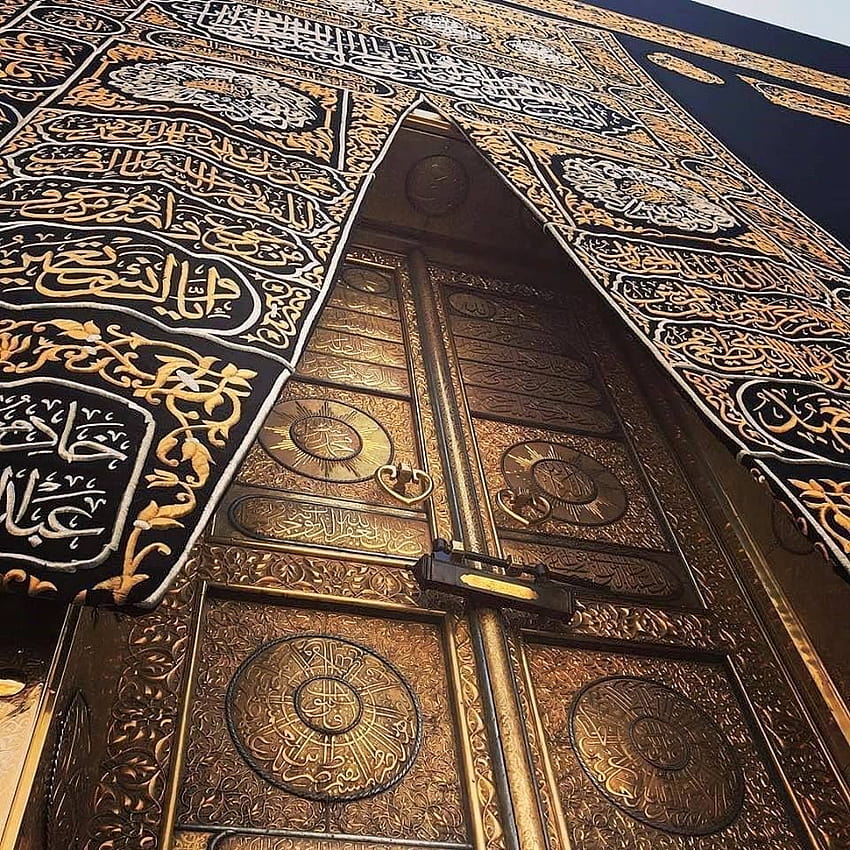
The Ka’bah
Al-Masjid Al-Haraam (the Sacred Mosque) is situated in Makkah, a city in the Arabian Peninsula 330 meters above sea-level. The history of the mosque goes back to its founding at the time of Ibraheem (Abraham) and his son Ismaa’eel (Ishmael), peace be upon them both. Makkah is the place where the Prophet of Islam, Muhammad (s.a.w) was born and where the Revelation began, and from which the light of Islam spread. Al-Masjid Al-Haraam is located here.
This is the first mosque that was built for people on earth, as Allah (swt) says in the Quran (interpretation of the meaning):
[Aal ‘Imraan 3:96]
“Verily, the first House (of worship) appointed for mankind was that at Bakkah (Makkah), full of blessing, and a guidance for al-‘aalameen (mankind and jinns).”
The Ka’bah – which is the direction of prayer for all Muslims throughout the world, is situated roughly in the middle of al-Masjid al-Haraam. It is a 15 meter high stone structure more or less in the shape of a cube. It was built by Ibraheem (peace be upon him) on the command of the Almighty. Allah (swt) says (interpretation of the meaning):
[al-Hajj 22:26]
“And (remember) when We showed Ibraheem the site of the (Sacred) House (the Ka’bah at Makkah) (saying): ‘Associate not anything (in worship) with Me, and sanctify My House for those who circumambulate it, and those who bow and make prostration.”
So, what’s it like in real life?
When you see the Ka’bah live, you have to pinch yourself and tell yourself that it’s not a dream. Everything is surreal. The hundreds of thousands people around you seem a blurr. The world stops. You blink. Then a Saudi guard ushers you along to stop creating congestion.
Up close the Ka’bah is quite big.

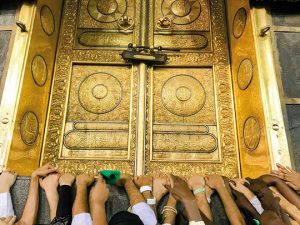
The door to the Ka’bah. The reason it is raised is back in history before the time of the Prophet, the tribe in command wanted to control who could enter inside and who couldn’t.
One of the best sights you will see on this journey is when you come back after the day of Arafat to do your tawaaf for Hajj. There will be a brand new black cloth over the Ka’bah which they place on Eid.
When it is brand new it is majestic and sparkling and you cannot take your eyes off it. I remember seeing a documentary a while ago on how they made the cloth. I remember it was specially made and the inscriptions were gold.
To think that Prophet Ibraheem built it originally after commanded by the Almighty to do so and here we are today praying right in front of it.
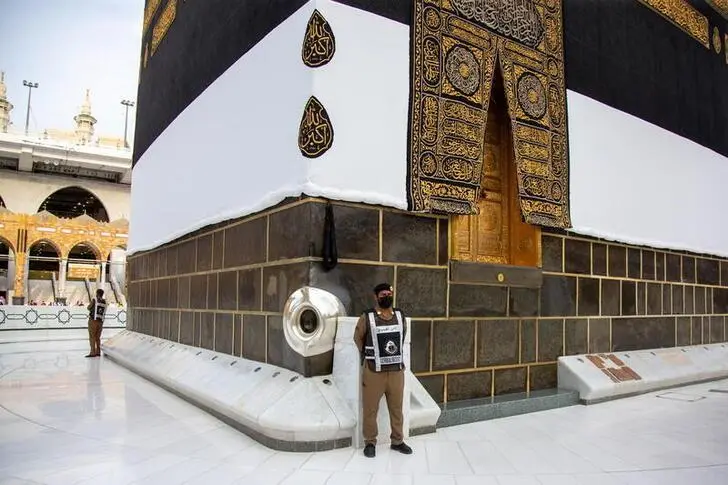
The Black Stone
The black stone or as its known in Arabic the Hajjar Al Aswad.
The guard protecting the black stone before prayer. The actual stone is located inside the silver frame you can see in the photo.
We believe that the Black Stone was sent down by the Creator to this earth from Paradise.
We were told by our beloved Prophet (s.a.w) that: “When the Black Stone came down from Paradise, it was whiter than milk, but the sins of the sons of Adam made it black.”
Therefore, if you are able to touch or kiss the black stone it is believed to be an expiation of your sins if you are sincere in doing so.
Now there is an absolute mad crush to try and get to the black stone given its significance. It’s amazing as humans how we sometimes fail to see the bigger picture. Imagine that we all lined up one by one, and allowed each other to take turns in kissing or touching it. We all would get the same reward and an equal go. It’s sad though that sometimes it becomes like the first 10 minutes of state of origin.
We also believe that the Black Stone will come forth on the Day of Resurrection and will testify in favour of those who touched it in truth.
There is a way that I guarantee in sha Allah (God willing) you can get to the black stone without pushing anyone (you might be pushed by the crowd though) and touch it or kiss it in under 5 minutes every time.
The only thing is once you’ve kissed it to try and get out of there is an absolute mission! The only way is to step up onto the ledge of the Ka’ba and push off like you’re doing backstroke and you’ll be around the corner near the station of Ibraheem in no time due to the crowd movement. My good friend Shareef showed me how to get the black stone back in 2010 and it’s worked every time.
I am sorry that I cannot share it with you, if you want to know how, it’s something that I’ve just got to show you!

Looking along the wall trying to get to the black stone. There’s a hint!
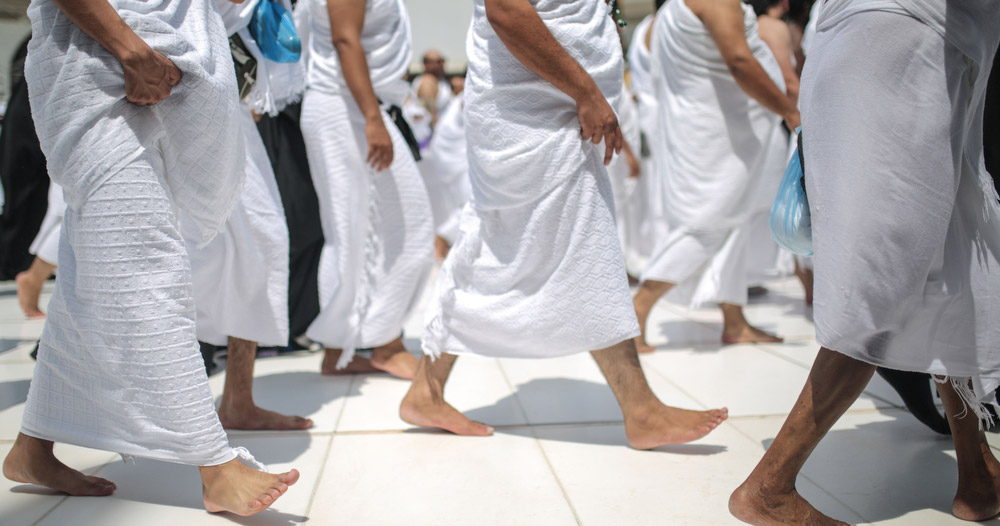
The Ihraam
(Ahmed)

To enter the state of Ihraam, one should observe the following:
- It is commendable to perform ghusl, i.e. bathe just as one would to be pure from janaba (major defilement).
- It is also recommended to shave the hair under the armpits, pubic hair and to cut one’s fingernails and toenails.
(Muslim)
As narrated by Anas (may Allah be pleased with him) that the Prophet (saw) set a period during which the moustaches and nails are trimmed, hair under the armpit is removed and those below the navel are cut. He asked us not to leave them unattended for more than forty days.
- It is commendable for a man to perfume his head and beard but not his garments.
Bukhari and Muslim
This is in keeping with what is narrated by Bukhari and Muslim from Aisha (May Allah be pleased with her) who said:
“I used to put perfume on the Prophet (saw) for Ihraam before he entered into the state of Ihraam.”
Note that this applies to men only. Women are strictly forbidden to wear perfume in the presence of men who are not their mahram. (A mahram for any woman is her husband or any male she is prohibited from marrying forever because of a relationship resulting from either blood, marriage, or breast-feeding.
Examples of mahram are brothers, fathers, and uncles. Brothers-in-law or cousins are NOT mahram!)
- Men must wear two pieces of clean cloth, preferably white. No underwear or head covering.
- It is commendable for men to wear footwear that does not cover the ankles.
(Bukhari)
The following etiquettes are advisable for men to adhere to while wearing the Ihraam clothes:
-
- Avoid walking around with only the bottom part of your Ihraam.
- Keep your right shoulder covered at all times (except during Tawaaf).
- Avoid throwing the loose end of your Ihraam over your shoulder, as you may hit the person behind you in the face.
- Try to keep your Ihraam clothes clean and do not use it as a cloth to wipe your hands.
- Take extra care as to how you sit, especially on stairs, to avoid exposing yourself. As it is not usual for you to be without underwear, you can easily expose your private parts. This is very common while sitting on the stairs inside al-Haram.
- Women are free to wear what they please, except clothes that are attractive to or imitative of men. They should also not wear gloves or a niqaab.
- You must enter into the state of Ihraam before or at the appropriate meqaat.
- Some tips:
-
- Passing the meqaat without adopting Ihraam is a violation of the meqaat rule. You should return to the respective meqaat or the nearest one, or perform a sacrifice (animal) as expiation.
- Women having their menses MUST also adopt Ihraam at the meqaat.
- Jeddah is NOT a meqaat for assuming Ihraam unless you are residing in it.
- People who reside within the meqaat (e.g. Jeddah), should assume the state of Ihraam from their residence.
- To enter the state of Ihraam, it is commendable that one utters the appropriate niyah once you get into a vehicle (or at the meqaat, if applicable):
لَبَّيْكَ الّلهُمَّ عُمْرَة
“Labbayk Allahumma Umrah”
Oh Allah here l am performing Umrah
For Hajj Tamattu and Ifrad
لَبَّيْكَ الّلهُمَّ حَجًّا
“Labbayk Allahumma Hajjan”
Oh Allah here I am performing Hajj
For Hajj Qiran:
لَبَّيْكَ الّلهُمَّ عُمْرَةً وَ حَجًّا
“Labbayk Allahumma Umrattan wa Hajjan”
Oh Allah here I am performing Umrah and Hajj
- There is no special salah (two rak’at) established in the Sunnah to be performed after adopting or related to the Ihraam.
- Before uttering the niyah (point 9) one is not considered a muhrim (in the state of Ihraam) even if one wears the clothes of Ihraam. Only after uttering the niyah does one become a muhrim and thus the following prohibitions An expiation (fidyah) is due if any of the prohibitions are violated intentionally:
Any muhrim:
- Men MUST NOT wear clothes that are tailored to fit parts of the human body, for example trousers, shirts, etc. There is a common misconception that one may not wear stitched clothes or sandals. However, this has no basis in the Sunnah, as it as an issue of fitted and not stitches. Hence, the Ihraam tops with studs should be avoided as it sometimes forms a fitted garment. Also, any sandal or shoe can have stitches as long as it does not cover the ankle.
- Men MUST NOT wear any underwear or headgear.
- Though women can wear what they please, they must NOT wear gloves or a face cover that has openings for the eyes (niqaab). If they normally wear a niqaab and wish to cover their face in the presence of non-mahram men, they can do so by fully covering their face. There is no need to wear a baseball type cap underneath as there is nothing wrong if the face covering touches the face.
- MUST NOT apply perfume, nor use any perfumed substances (shampoo, soap, etc.)
- MUST NOT cut his/her nails or hair.
- MUST neither marry, give anyone else in marriage, nor propose marriage.
- MUST NOT perform any act likely to arouse sexual passion or indulge in any intimate marital relations.
- MUST NOT hunt or participate in hunting.
- MUST NOT commit an act of disobedience to Allah (swt), such as smoking.
- MUST NOT get involved in idle talk or disputes, arguments and quarrels.
The following actions are permissible for a muhrim:
- CAN wear a wristwatch, eyeglasses, hearing aid, money belt, sunglasses, etc.
- CAN bathe or a shower with unscented soap but should wash and gently rub the head and body, even if some hair may fall out.
- CAN change his/her Ihraam garments to other Ihraam garments. Removing the Ihraam clothes does not nullify the state of Ihraam. One’s Niyah places one in the state of Ihraam and cutting of one’s hair removes one from this state.
- CAN have shelter over your head, whether in a car, under an umbrella, or in a building.
- CAN cover your body (including feet) with a blanket while sleeping (men should not cover their head).
- If one, while entering the state of Ihraam, fears that he or she is likely to be subjected to illness or anything else that might obstruct his or her Umrah, then one can recite a clause of stipulation (ishtirat) to Allah (swt) by saying:
فَإِنْ حَبَسَنِي حَابِسٌ فَمَحِلِّي حَيثُ حَبَستَنِي
“Fa in habasani haabisun, fa mahilli haithu habastani”
Thus, if I am hindered by any obstacle, then my place of conclusion is where You have held me
- This stipulation is not favoured if circumstances are normal. This is based upon the Prophet’s (s.a.w) order to Dhuba’ah Bint Al-Zubair to pronounce the statement of the ishtirat when she complained of being ill. Narrated by Bukhari and Muslim.
- However, I would recommend this for women who have or anticipate that their menses may start and possibly prevent them from completing their Umrah. Details of the various scenarios and rulings related to the menses can be found in chapter three of my Hajj book (“Getting the Best out of Hajj”). Just to reiterate, women in their menses MUST also enter into the state of Ihraam at the meqaat boundary.
- The advantage of uttering this stipulation is that if one is faced with an obstacle that prevents one from completing Umrah then it is permissible to make tahallul, e., to conclude the Umrah early without expiation (fidyah), which is the slaughtering of a sheep. The muhrim must still cut his or her hair in order to be released from the state of Ihraam.
- It is desirable for the muhrim to utter the Talbiyah very loudly as often as possible from the time of entering the state of Ihraam until the time that he begins the Tawaaf around the Ka’bah. A woman raises her voice only to the extent of being heard by the person next to her. Remember the Talbiyah is you affirming that you have answered the call from your Lord, so don’t be reluctant or lazy to utter it continuously.
Bukhari
According to a Hadith narrated by Bukhari, the Prophet (saw) used to recite the Talbiyah by saying:
لَبَّيْكَ اللَّهُمَّ لَبَّيْكَ، لَبَّيْكَ لا شَرِيكَ لَكَ لَبَّيْكَ،
إِنَّ الْحَمْدَ وَ النِّعْمَةَ لَكَ وَ الْمُلْكَ لا شَرِيكَ لَكَ
“Labbayk Allahumma labbayk. Labbayka laa shareeka laka labbayk. Innal-hamda wan-ni’mata laka wal mulk. Laa shareeka lak”
Here I am Oh Allah, here I am. You have no partner, here I am. Surely all praise, grace and dominion are Yours, and You have no partner
- Ponder over the meaning of the Talbiyah as you recite it. Allah (saw) ‘called’ you and you have answered His call…
- Obey the Ihraam rules. You are the Guest of Allah (saw)!
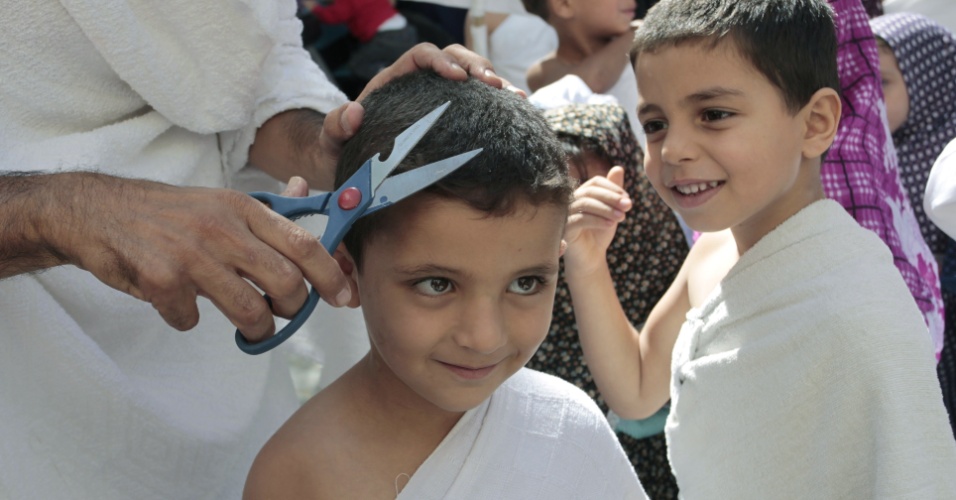
The three methods of Hajj:
- Tamattu – Adopt Ihraam with niyah for Umrah; Complete rites of Umrah; Cut hair and relief from Ihraam; On the 8th adopt Ihraam with niyah for Hajj; Hady compulsory. This is the method of Hajj that we will be completing in sha Allah.
- Qiran – Umrah and Hajj together; Adopt Ihraam with one niyah; Tawaaf-ul-Qudoom is optional (welcome tawaaf); Hady compulsory.
- Ifrad – Adopt Ihraam with niyah for Hajj only; Tawaaf-ul-Qudoom (optional).
- All the other Hajj rites (i.e.: Arafat, Muzdalifah, Mina, Ramy, Tawaaf-al-Ifadah, Sa’ee for Hajj) are the same for all three methods.
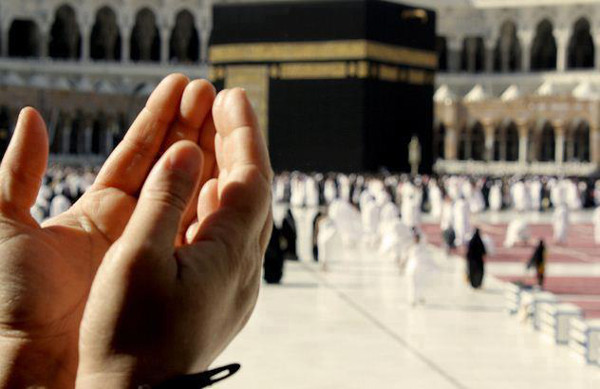
The four Pillars (Arkan) of Hajj:
The pillars of Hajj are the rites that are compulsory for the validity and completion of the Hajj. They cannot be omitted or substituted:
- Ihraam (with niyah for Hajj).
- Standing at Arafat.
- Tawaaf-al-Ifadah.
- Sa’ee for Hajj.
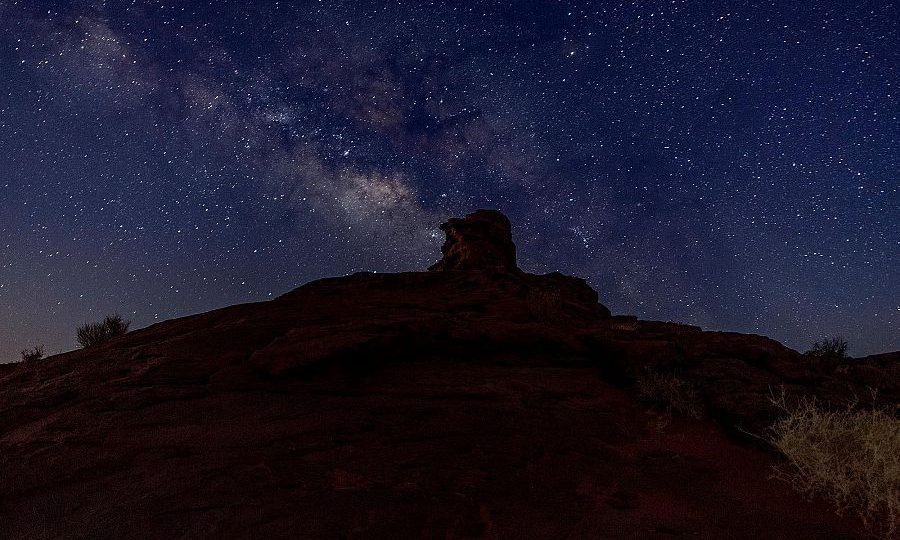
The seven Obligatory acts of Hajj:
The obligatory (wajib) rites of Hajj are the rites that if omitted requires the pilgrim to offer a sacrifice (fidyah):
- Ihraam at the meqaat.
- Being at Arafat until sunset.
- To spend the night (or part of) in Muzdalifah.
- To ramy (cast pebbles) at the Jamr’at.
- To shave the head or cut the hair.
- To spend the nights of Tashreek in Mina.
- To perform Tawaaf-al-Wadaa

The seven Conditions of An Accepted Hajj
It has been said by the scholars that there are seven conditions of an accepted Hajj, two conditions before Hajj, three conditions during Hajj and two conditions after Hajj.
These seven conditions are summarised as the following:
Before Hajj
- Sincerity and intention. Doing the deed and action of Hajj for no one else but for the sake of your Creator.
- Ensuring that your trip of Hajj is financed by an allowable source of income, i.e. a halal income. This is very important.
During Hajj
- Sincerity again.
- Performing Hajj in accordance with the guidance and teachings of our beloved prophet peace be upon him. In accordance with the Sunnah.
- Performing Hajj without committing any sin.
After Hajj
- Sincerity again. The fact this appears three different times, is a reminder to us all that what matters most in our religion is our sincerity and intention. Anything that we do will be rejected if we don’t do it for the right reason and for the sake of the Almighty.
- We are a better person, a better Muslim afterwards than we were before.
The 6 days of Hajj Day by Day:

What to take to Mina and Arafah:
Obviously, each person has his or her own specific needs, and it all depends on the facilities your specific group will provide. The suggested items listed are merely a guideline.
| Items (all for Mina) | Take it to Arafat: |
| Quran; dua and Hajj books | ✓ |
| Medicines; plasters; bandages | ✓ |
| Toothbrush; toothpaste; miswak | ✓ |
| Sanitary pads (women) | ✓ |
| Tissues (non perfumed) | ✓ |
| Water flask; biscuits; some fruit | |
| Umbrella; sunglasses | ✓ |
| Sleeping Bag | ✓ |
| Small backpack for these items | ✓ |
| Small bottle or bag for stones | ✓ |
| Money (even if you have paid for food) | ✓ |
| Dinner & breakfast for Muzdalifah | ✓ |
| Clothes for at least two days | |
| Towel; hairbrush; Alarm | |
| Small scissors (women) | |
| Non-perfumed and normal soap | |
| PATIENCE | ✓ |
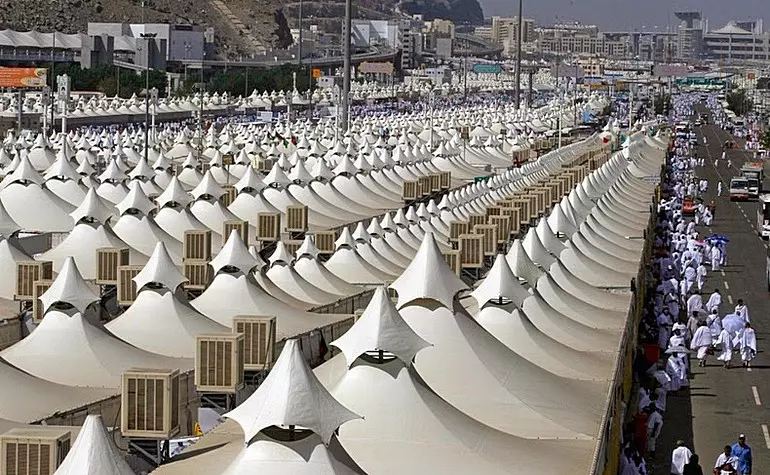
Mina (Day 8, Days 10-13)
Mina is a part of the holy land. From the pictures or TV it is recognisable as the tent city, where you can see tents for kilometers. We move from Makkah or wherever we are to Mina on the eighth day of the Islamic month of Dhull Hijjah, the month which Hajj falls in. Mina itself comes from the three arabic letters ‘meem’, ‘noon’ and ‘yaa’. It stems from the arabic word Manna which means the following:
- The hope of gaining something; or
- Wishing to gain something.
This has a direct correlation to what we are here for on Day eight as part of the Hajj rights! We are here to rest and to focus mentally, spiritually and physically for the next day. We are all here today hoping to gain the reward of day nine which is Arafah! This day is where we hope to be forgiven for all our previous sins! It’s amazing how the names of the places we are at have direct correlations to what we are doing in relation to Hajj.
In Mina we shorten our prayers but do not join them at pray them each at their appointed times. We will pray a total of five prayers here on Day 8/9, Dhuhr (noon), Asr (afternoon), Maghrib (sunset), Isha (evening) and Fajr (dawn) before we head off to Arafah.
It’s very interesting to see everyone’s reactions to the tents. They are somewhat mixed and the ones who aren’t phased by it initially, will be later when reality hits. Generally, this occurs once they settle down and work out the logistics of what is around, unfold their sofa mattress and fall asleep only to wake up 20 minutes later with someone stepping on them, or the air-conditioning not working or even better needing to go to the toilet! Then it dawns on them they are here for more than just the next five minutes. Welcome to Mina where you are now with four million of your brothers and sisters!


The tents, our home for the next six days. There cosier than they look when you wake up on top of the person next to you!
Toilet and shower in one! The luxuries of Mina!
Two or three nights in Mina?
One of the things I thought I would give my thoughts on, is the issue of whether you should stay two or three nights in Mina as staying the third night is not compulsory as long as you leave the boundaries of Mina before maghrib (sunset prayer). It is the ‘strong’ ones who remain behind.
Inevitably on the third day people begin to contemplate on whether to leave today or not. I normally listen to all the comments back and forth for a while. Some were trying to put the blame on the ‘women’ and saying ‘my wife is not feeling well I have to go’ when I think it was really them deep down inside who’d had enough and just wanted to pack up and leave.
One thing that I have noticed based on my experiences over the past few years is that everyone and I mean everyone seems to lose their patience after the day of Arafah. People who have been tolerant of everything that comes their way are no longer so tolerant and lose their temper and patience over the smallest of things. Suddenly a bump in the crowd causes an argument or a wait in the queue for the toilets doesn’t have the same sense of order or manners. People begin knocking on the doors to the toilets saying hurry up! Don’t they understand that when nature calls you let nature take its course! So my advice to people, if you really want to know whether you’ve made the best of Hajj and that the journey has had the impact on your spirituality that you desired and whether your Hajj is going to be accepted: judge yourself on the few days after Arafah and not on the few weeks before! That will give you a true indication.
So back to the two or three nights? Back in 2010 I left after two nights so all the thoughts and arguments that people generally make I can relate to as I had been there myself.
So apart from using the women as scapegoats the boys were saying:
- If the Prophet (s.a.w) had a decision to make between two choices he always took the easiest option. So, I’m going to take the easy option and follow the Sunnah bro.
- Have you seen the mountains of rubbish and streets outside? It’s too unhygienic to stay.
My advice to everyone on the issue of the two and three nights is the following:
- Back in 2010 I left after two nights and for a year I felt like I cheated myself and took the easy way and regretted it so don’t make the same mistake I made.
- In the years since 2010 I have stayed the three nights and out of all the nights in Mina before or after Arafah the last night was the best and had the most tranquil feeling.
- Follow the sunnah. Our beloved Prophet (s.a.w) only performed Hajj once. To date they had done everything in accordance with the way that He had performed his Hajj, so why now after spending more than $13,000 each and three weeks of their time right at the end are they wanting to take a shortcut?
- The Almighty reminds us with verses in the Quran that those who are patient will receive their rewards in FULL, so be patient and receive the FULL rewards for this journey.
- That many people leave today so we can go tent shopping and pick any tent we want and have it to ourselves.
- When again are we going to have the opportunity to spend time like this with one another and also those around us including the Sheikhs and the fellow Hajj group members? That time is gold.
- Mina will actually be cleaner tonight and tomorrow then it was yesterday as the bobcats and trucks move in from tonight to clean the place up.
- All your going to do if you leave tonight is sleep in Shisha as opposed to the tent. For what?
- There is a group in the Quran that are mentioned as the ‘forerunners’ as they surpass everyone else in good deeds lets try and be amongst them.
On the third night you will have the most enjoyable night. We will have more room to ourselves in our tents. We will have the toilets and place to ourselves. Most of all, we will be the strong ones referred to by the Almighty that stay behind and do the third night.
So, two or three nights? Make it three every time!
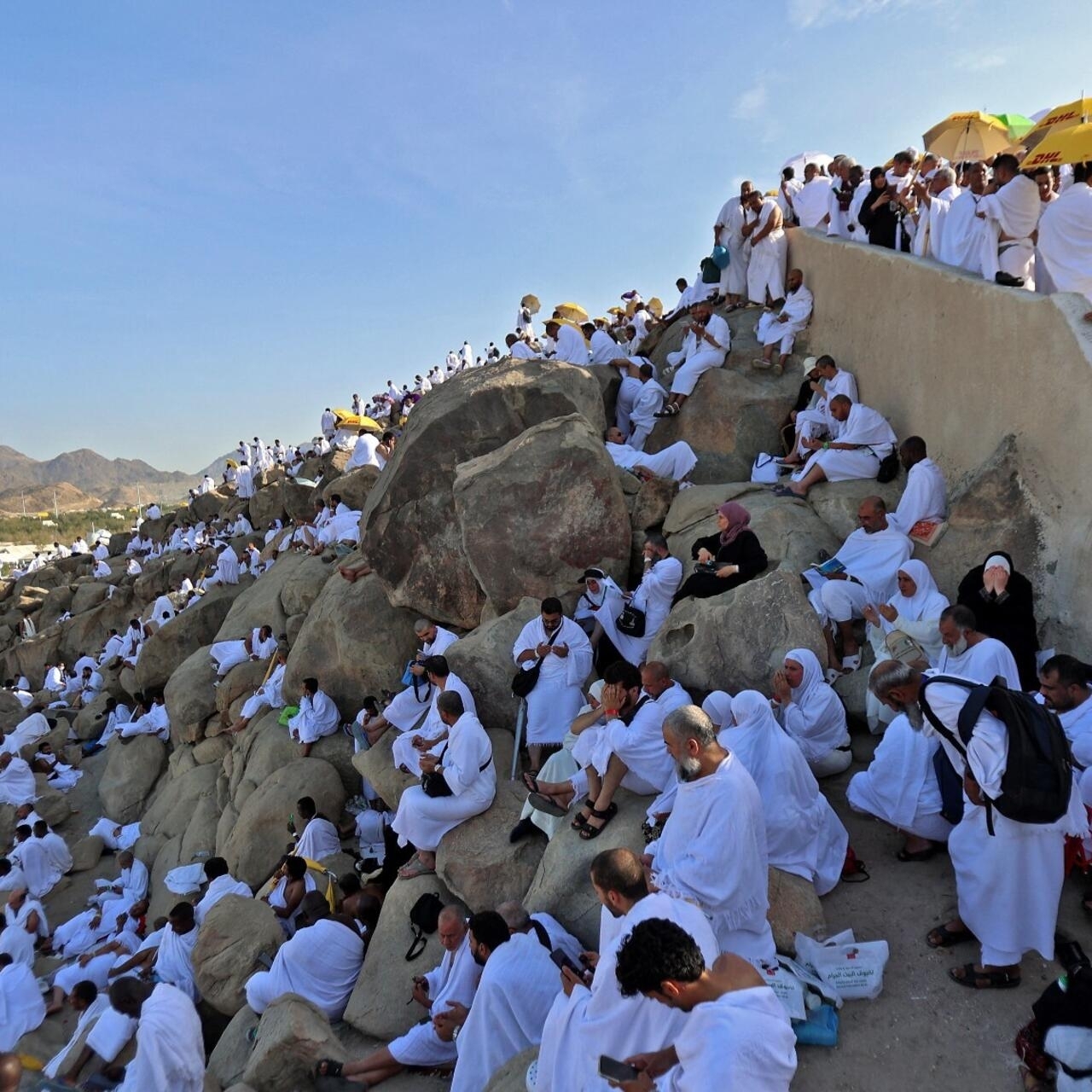
Arafah (Day 9)
This is the most important day of Hajj. Why is today the most important? This is the day of purification. Also, our beloved prophet (s.a.w), said “Hajj is ‘Arafah”. This means that in Hajj it is essential to stand in ‘Arafah. Whoever does not stand in ‘Arafah has missed out on Hajj.
Therefore, you will see that the Saudi authorities, the group leaders of your own groups and just everyone in general will be on edge today until they get there to their dedicated place of Arafah. Miss this and you miss out on the journey of a lifetime!
Whereas, if you miss out on some of the other actions on Hajj, there are penalties that you can pay to make up for them, not so for standing in Arafah as it is compulsory.
You have got to give it to the Saudis as pilgrims who are too sick and in hospital etc they drive them through Arafah on the back of an ambulance or even fly them over or a few minutes in a helicopter so that they complete their Hajj.
So why is this day so special?
Today is the day that Allah (swt), the Almighty, the Creator of the Heavens and the Earth comes to the lowest of the seven heavens which is the closest to earth, in a manner befitting His Majesty and boasts in front of his angels saying “look at my slaves they have come dirty and dusty and untidy, what have they come here for?”. The angels reply “you know best what reason they have come hear for”. The Almighty then boasts in front of the angels “bear witness I have forgiven them!” Allahu Akhbar! God is the Greatest!
Also, on this day the Almighty frees or emits his slaves from the hellfire more than any other day of the year. This is the day that the shaytaan (devil) is humiliated the most due to the Mercy of the Almighty.
The day of Arafah is also the day that our religion was completed. It is also the day that the Almighty put His favours and blessings upon our nation by choosing Islam as their religion.
So, we move to Arafah. We join and shorten the Dhuhr (noon) and Asr (afternoon) prayers at the time of Dhuhr. This is so we have more time to stand facing the Ka’bah until sunset in supplication.
The meaning of Arafah in Arabic is to know someone or to get to know someone. Amazing! Allah wants you to get to know Him on this day!
We do this by affirming His oneness in his worship in his lordship and his names and attributes by the best supplication on this day that we can say:
لا إِلهَ إِلاَّ اللهُ وَحْدَهُ لاَ شَرِيْكَ لَهُ، لَهُ لْمُلْكُ
وَ لَهُ الْحَمْدُ وَ هُوَ عَلَى كُلِّ شَيءٍ قَدِيرٌ
None has the right to be worshipped but Allah alone, Who has no partner (affirming worship). His is the dominion and His is the praise (affirming lordship), and He is able to do all things (affirming His Names and Attributes).
Also, to show you the magnitude of this day there is a saying by one of the pious scholars of the past:
The worst person on the day of Arafah is the one that believes Allah (swt) will not forgive him!
From my experience many people don’t make the most of the two-three hours we have to make supplication and to ask for anything that we like most of all which is to ask for forgiveness.
They sit and talk and make all their prayers and are finished in under an hour and not sure what to do next.
You should prepare a list of things well before you come. Focus on yourself, your parents, your spouse, your children, your relatives, the scholars, the greater community and the Muslims as a whole.
Get people to write things they want said for them on this day. This will also help you with your own as you read theirs plus benefiting those friends and family close to you who will hopefully return the favour when they go.
I have also found that using the 99 names of Allah (swt) s very good. When you get to the Sustainer, you ask for sustenance in this life and the next, when you get to the Protector, you ask for the protection of yourself and family and so on.
Think about death. On this trip nearly every single prayer we have been praying the funeral prayer on people that have passed away. Death is just around the corner for all of us. What have we done to prepare for it?
Think about the grave. Think about the day of judgement. Think about the bridge to cross As-Siraat. Think about the hellfire and think about paradise, not just paradise but ask for the highest of paradise!
This day reminds you so much of the day of judgment as we have had it described to us. No one is concerned with anyone else other than themselves.
Another thing about the day of Arafah is that it is extremely extremely hot! Like a reminder of the day of judgment where the sun will only be a mile above our heads and people will drown in their own sweat. You need to keep your fluids up as you just sweat and sweat and sweat.
It is normally too hot to go outside early on unless you find some shade but even then you can’t last long. Then later in the afternoon an hour before sunset as if someone’s prayers have been answered a breeze comes through and cools the entire place down! Amazing! In a valley! Everyone emerges from their tents. You see everyone in tears. Crying for forgiveness for all their sins. Crying for Mercy. Asking in Hope.
Right then when you have finished your supplications and the sun sets and you are emotionally, physically and mentally drained….there is no better feeling in the world and you have never been on more of a spiritual high having being forgiven for all your previous sins!
On the bus to and from Arafah, you find as soon as you leave Mina the Talbiyah starts up as enthusiastically as it did when you left the Meqaat in Madinah for Umrah or on the airplane.
Photos: In the tents at Arafah. People praying for forgiveness amongst other things in Arafah. The sun setting at Arafah. An unbelievable sight to an unbelievable day.







Muzdalifah (Day 9)
After the sun sets at Arafah you can see there is a sense of relief and joy on everyone’s faces. People go around hugging each other or if they are blokey blokes the good old handshake and then interlock of hands followed by the pressing of chests and pat on the back.
The next thing on everyone’s minds is, are we really going to be sleeping on the floor in Muzdalifah? No, seriously are we? But the tents here in Arafah even though they don’t have air-conditioning and we are getting eaten alive by mosquitoes are nice, can’t we just stay here?
Muzdalifah comes from the three arabic letters zul, la and fah which means “to come closer to something”. The next day we come closer to Allah’s (swt) house as we visit the grand mosque in Makkah. Amazing! Also as mentioned previously Arafah is outside the Har’am (holy boundary of Makkah) whilst Muzdalifah is inside. The reason that we are taken outside this boundary is that the Almighty wants us to be in the purest of state when reentering as we will have been forgiven all of our previous sins. Amazing!
So, picture this, three million people have to move to Muzdalifah and get there before midnight. That’s six hours. Let’s say half a million people walk. 2.5 million left to be transported by bus. Let’s say 60 people on a bus per average. That means there has to be a total of 41,666 bus trips made back and forth in the six hours!!!!!
As soon as you reach Muzdalifah, you should perform Salatul-Maghrib and Eshaa (joined) or where you are if it is close to midnight {Eshaa shortened to two rak’at. One adhaan and two iqaama}. As soon as you finish praying the sunnah is to go straight sleep. In the morning you perform Salatul-Fajr (also the two Sunnah rak’at). After the prayer you Supplicate then leave for Mina before sunrise.
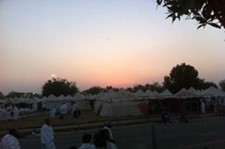



Photos: The pilgrims sleeping on the floor in Muzdalifah. Looking up at the sky and the view of the moon.
Normally people are shocked when they come to Muzdalifah. I am not sure whether it is the fact they were sleeping on the dirt amongst thousands of others, the noise of the hundreds of buses driving past, the inhalation of the diesel from the buses or the dirt in the eyes that was being blown from the buses that go past that has everyone in utter disbelief!
Day 10- The Greatest Day of Hajj


Whilst Day 9 is the most important day of Hajj, Day 10 of the month of Dhull Hijjah is the biggest day of Hajj. This is because while the rest of the Muslims around the world celebrate Eid Ul Adha (the day of sacrifice), the pilgrims have the most amount of things to complete that day.
There are five separate things that we must complete that day. However, given the sheer number of people and crowd and logistics it is impossible for every single pilgrim to complete it all on the one day, so it is ok to do them over the next few days.
However, in saying this our beloved Prophet (s.a.w) completed all acts on the same day, so it is commendable to try and do them all the same day.
The first thing that we must do (all pilgrims must complete this) is the stoning of the Big Jamarat.
We will catch a bus back to our tents to Mina in the morning from Muzdalifah (it’s actually quicker to walk due to the traffic sometimes). We usually have a 30-60 minute rest before beginning our walk to the jamarat (place of stoning). This walk is approximately four kilometers and there are quite large crowds as every pilgrim is required to stone today and will take about an hour to do.
The second thing we do after completing the stoning is the Hady (sacrifice of a lamb). Obviously, this is not something that you can just do on your own and is usually organised by your group and included as part of your package. You will however see in the streets of Mina certain people who have gone and done the sacrifice themselves up in the mountains or elsewhere and begun cooking them as you walk back later that day.
The third thing that we do on that day is the shaving of the head for men or just a trim for women. The wisdom behind shaving the head is to give up everything for the sake of your Lord. A lot of time can be wasted in life spent on managing your hair or in my case worrying about your hair (mine has begun to recede!) and this way all your time over the next few days can be devoted to remembrance and glorification of the Creator of the heavens and the earth. We also believe that for every hair shaved a good deed is written for you and a sin is forgiven.
Another reason for shaving the head is that it makes everyone look the same just as they were when they were all in Ihram.
So, a couple of million blokes need to get their head shaved? Hmmm. Barbers??? You’ll be in a queue for hours! The only thing you can do in this situation where you want to complete everything on the same day, go to the streets! There is normally a group of people in one alley way that is not far from our Shisha apartments that become barbers for the day. Look dodgy? Yes! Was there a bit of blood around? A little. Main thing is to ensure they were using new blades on each person so as we say when you put yourself in a situation where only the Almighty can help you, Bismillah (in the name of Allah (swt))! 10 riyals and three minutes later you should now be bald in the streets with a couple of nicks to the scalp!

Once the head is shaved this now meant two things, you can come out of Ihram and wear normal clothes again and you could shave others heads!
The fourth thing that needs to be done on the day is to go and complete Tawaaf at Masjid Al Haram. We normally have two separate groups that go and perform Tawaaf. Due to the crowds it can get a bit overwhelming for some people to try and do it all on the same day so we cater for both. Usually there is a small group of people that go and perform Tawaaf that same day, otherwise we organise a Bus that takes the group from Mina at about 3 o’clock in the morning to go and perform Tawaaf. It is recommended for the elderly and women to take this option.
The final act is the Sa’ee that needs to be completed once you complete your Tawaaf. Upon finishing Sa’ee, you reflect and contemplate on what you’ve achieved. You feel like Rocky running up those steps and wanting to scream and raise your hands in the air! You don’t care that you’ve still got to walk back to your tent tonight (well you do but your too tired to think about that). You look around you and people are sleeping just where Sa’ee ends at Mount Marwah. Again, you see the elderly and the children and are amazed at how they’ve completed the same thing that you just did.
Then, you reflect back on our beloved Prophet (s.a.w) who had no buses, no tunnels, no roads and only mountain terrain to combat. Who didn’t have a bus to take Him on the 15 kilometers that we were on a bus for, from the night before. Who stayed at Muzdalifah until just before sunrise and didnt leave before or straight after Fajr (dawn prayer). Who after throwing the stones sacrificed 63 camels himself before heading to Makkah. Who peace be upon him had completed everything we had just done and was back at his tent in Mina before Dhuhr (noon prayer)! Amazing and unbelievable!
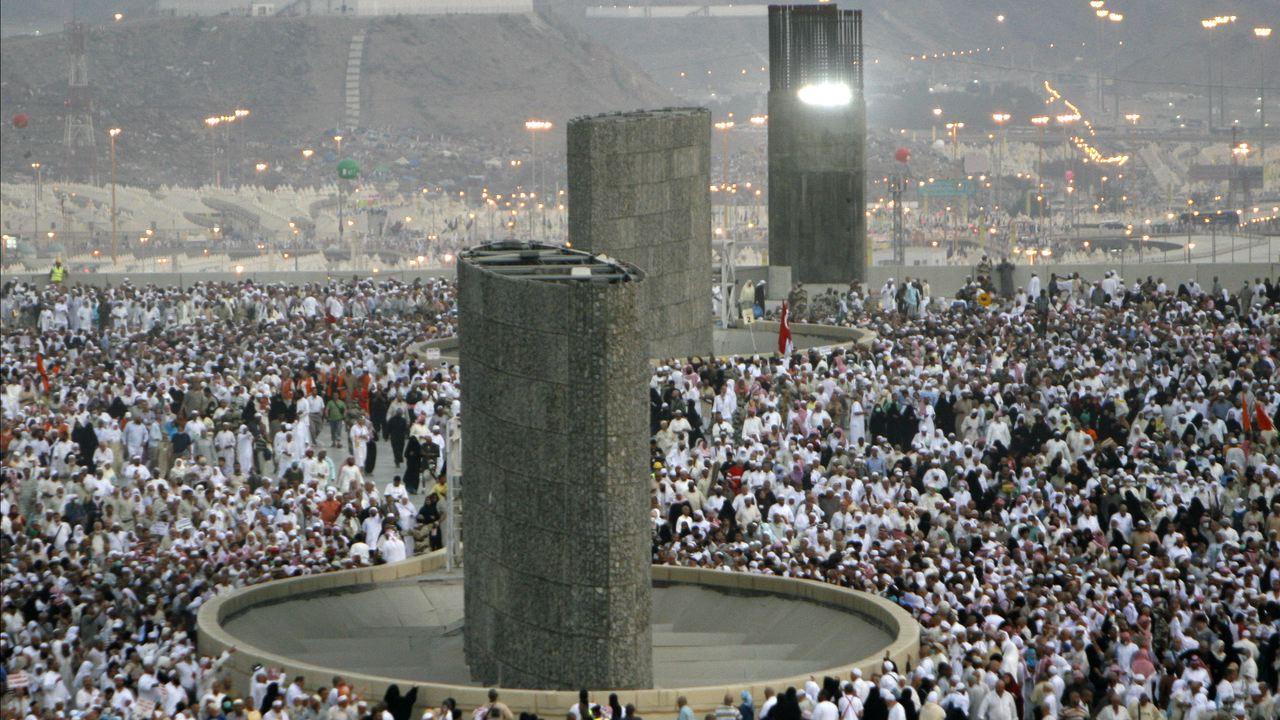
Jamarat- The Days of Stoning
On Day 10 we only stone the Big Jamarat. The 11th, 12th and 13th (optional) of the month of Dhull Hijjah are the days of stoning.
So, what is the purpose of this and where does it originate from?
This all stems from the story of Prophet Ibraheem (Abraham) and his son Ism’aeel peace be upon them both.
Prophet Ibraheem saw in a dream that he was sacrificing his son. In Islam we believe that dreams of the Prophets are revelation from the Almighty and the only aspect of prophethood that remains after the Final Prophet Muhammad peace and blessings of Allah be upon him is that of true dreams.
Ibraheem told his son Ism’aeel what he had seen in the dream. Ism’aeel responded to his father by telling him to do what you have been ordered to do. Imagine that?
So Ibraheem took his son from Makkah to the place of Mina. He then laid him face up and prepared to sacrifice him. However, Ism’aeel said to his father that he shouldn’t do it that way as it would be too difficult for him to see his face as he sacrificed him and rather that he should sacrifice him from the back with him laying face down.
Prophet Ibraheem then went to sacrifice him, however the knife would not work and wilted every time he tried. Then the shaytaan (devil) appeared warning Ibraheem against doing it and asked him what was he doing and tried to deter him etc. Ibraheem then grabbed 7 stones and stoned him and the shaytaan ran off. Ibraheem then moved away from that place and went approximately 50 meters away and tried again to sacrifice his son Ism’aeel. Again, the knife wilted when he tried and the shaytaan came to him and he pelted him with 7 stones. Again, he moved away further and the same thing occurred and for the third time he pelted the shaytaan and this time the shaytaan did not return.
That is why the last place of stoning is called the Big Jamarat as the shaytaan was destroyed.
Then glad tidings were given to Prophet Ibraheem peace be upon him as he had passed the test and a lamb was set down as replacement for him to sacrifice.
Ibraheem’s test meant that he earned the title of the ‘Loved one of Allah’ (swt) as he went to sacrifice his loved one, his son Ism’aeel.
People stoning at the Big Jamarat (place of stoning).
So, the reason that the pilgrims stone the Jamarat is to follow the command and manifest submission and servitude to Allah (swt) and show complete obedience without rational thought or the ego having any part in it. The aim is also to imitate Ibraheem (peace be upon him), when shaytaan (may Allah (swt) curse him) appeared to him in that place to instill confusion in his mind or tempt him to sin, and Allah (swt) commanded him to throw stones at him so as to drive him away and dash his hopes.
The symbolic nature of stoning is to expel the shaytaan from your mind with a serious attitude and determination. We are throwing them in the face of the shaytaan and breaking his back with them, because nothing annoys him more than a person obeying the command of the Almighty.
Recommended way to stone the Jamarat
The recommended way to complete the stoning of the three pillars is the following:
- Approach the small Jamarat and throw stones from the left-hand side (i.e.) left shoulder facing Makkah and right shoulder facing Mina.
- After completing the stoning cross over and move to the right-hand side and stand facing the Ka’bah and make supplication for as long as you can and as long as the army allows you too. In busy times (between noon and sunset) you will be moved along almost immediately.
- Stone the middle Jamarat from the right-hand side and then cross over to the left-hand side and make supplication facing the Ka’bah for as long as you can.
- Stone the big Jamarat from the left-hand side with your left shoulder facing to Makkah. (On day 10 we only stone this)
- There is no supplication after stoning the Big Jamarat.
Just a couple of tips:
- Try to avoid the rush times between Dhuhr (noon prayer) and Maghrib (sunset prayer). This is due to the heat and crowding.
- Try and avoid the bottom floors for the same reason.
- When approaching the Jamarat go around the side and approach it from the back. This way you will avoid the congestion at the front and save yourself from getting hit in the head with stones and the occasional shoe from over zealous pilgrims!
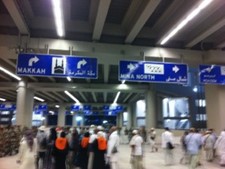
The signs directing you after you have completed the stoning.
Where do I get the stones from?
You can get the stones anywhere from Muzdalifah to Mina. There are literally millions of them everywhere!
Just be careful when you do get them that you don’t pick up anything with them be it a bit of rubbish or the odd hair from people that have shaved their head in Mina!
You’ll need 70 stones if you are staying the three days and its always good to get a few extras.
It’s amazing that when you are stoning and on the way to the Jamarat how many times you will take your stones out and count them to make sure you’ve got enough! Even when you’ve taken 7 stones out ready, you’ll count them in your hand a second and third time just to make sure one has fallen or you didn’t miscount.
The walk to and from the Jamarat
One of the things that you will always remember is the long walks to and from the Jamarat from your tent. Along the way just like the tawaaf you will see so many different people from different countries. This time all the groups have flag bearers so that you are able to keep up with your group as it is very easy to get lost in the crowd.
Being from the Australian section we have the furthest distance to walk. Most of the groups will take the long tunnels from this section. They now have two new tunnels that ended up linking directly with the third floor of the Jamarat. There was no longer a way to reach the ground floors through the tunnels.
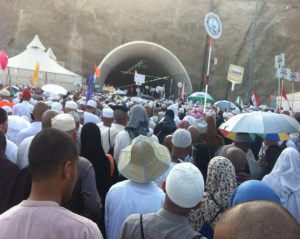
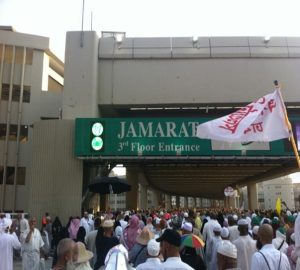
Photos: The new tunnel. The entry to the third floor of the Jamarat from the new tunnel.

How to Perform Funeral Prayer
- You say the first Takbeer (“Allahu Akbar”), then you seek refuge with Allah (swt) from the accursed Shaytaan, then you say Bismillah ir-Rahmaan ir-Raheem and recite al-Faatihah followed by a short surah or some ayahs.
- Then you say second Takbeer and send blessings upon the Prophet (s.a.w) as one does at the end of the prayer.
- Then you say a third Takbeer and make dua for the deceased:
- Then you say a fourth Takbeer and make dua for the Ummah, then you say one Tasleem to the right, saying “Assalaamu‘alaykum wa rahmat-Allah.”
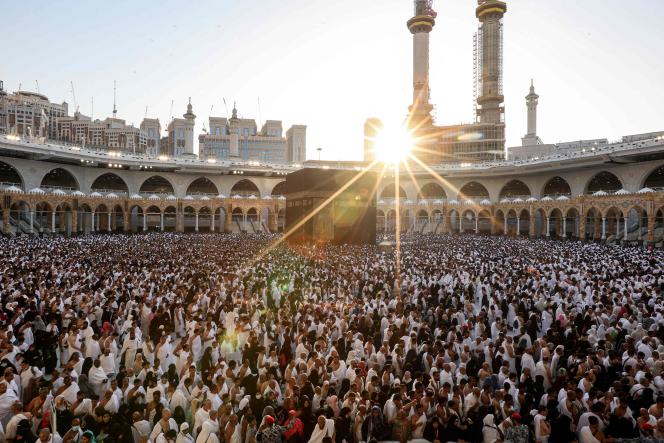
The virtues of the first 10 days of Dhul-Hijjah
(Bukhari)
This information has been inspired by the words of the Prophet (peace be upon him) who said: “There are no days on which righteous deeds are more beloved to Allah than these ten days.” They said: “Not even jihad for the sake of Allah?” He said: “Not even jihad for the sake of Allah, unless a man goes out himself for jihad taking his wealth with him and does not come back with anything.”
Another often overlooked bounty of this trip of a lifetime is that Allah (swt) has blessed the pilgrims to be in the best possible place for the best days of the year.
Various texts and others indicate that these ten days are better than all the other days of the year, with no exceptions, not even the last ten days of Ramadan. But the last ten nights of Ramadan are better, because they include Laylat al-Qadr (“the Night of Power”), which is better than a thousand months.
The virtue of these ten days is based on many things:
Allah (swt) swears an oath by them, and swearing an oath by something is indicative of its importance and great benefit. Allah (swt) says (interpretation of the meaning):
[al-Fajr 89:1-2]
“By the dawn; by the ten nights”
Ibn ‘Abbaas, Ibn al-Zubayr, Mujaahid and others of the earlier and later generations said that this refers to the first ten days of Dhu’l-Hijjah. Ibn Katheer said: “This is the correct opinion.” (Tafseer Ibn Katheer, 8/413)
The Prophet (s.a.w) testified that these are the best days of this world, as we have already quoted above.
The Prophet (s.a.w) encouraged people to do righteous deeds because of the virtue of this season for people throughout the world, and also because of the virtue of the place – for the Hujjaaj (pilgrims) to the Sacred House of Allah (swt).
The Prophet (s.a.w) commanded us to recite a lot of Tasbeeh (“Subhan-Allah“), Tahmeed (“Al-hamdu Lillah“) and Takbeer (“Allahu Akbar“) during this time.
(Reported by Ahmad, 7/224)
‘Abdullaah ibn ‘Umar (may Allah be pleased with him and his father) reported that the Prophet (peace and blessings of Allah be upon him) said: “There are no days greater in the sight of Allah and in which righteous deeds are more beloved to Him than these ten days, so during this time recite a great deal of Tahleel (“La ilaaha ill-Allah“), Takbeer and Tahmeed.”
These ten days include Yawm ‘Arafah (the Day of ‘Arafah), on which Allah (swt) perfected His Religion. Fasting on this day will expiate for the sins of two years (for those who are not performing Hajj). These days also include Yawm al-Nahar (the Day of Sacrifice), the greatest day of the entire year and the greatest day of Hajj, which combines acts of worship in a way unlike any other day.
Among the good deeds which the Muslim should strive to do during the first ten days of Dhu’l-Hijjah are:
Fasting. It is Sunnah to fast on the ninth day of Dhu’l-Hijjah (for those that are not performing Hajj), because the Prophet (s.a.w) urged us to do good deeds during this time, and fasting is one of the best of deeds.
(Reported by al-Bukhaari, 1805)
Allah has chosen fasting for Himself, as is stated in the hadeeth qudsi: “Allah says: ‘All the deeds of the son of Adam are for him, except for fasting, which is for Me and I am the One Who will reward him for it.’”
For those who are performing Hajj the sunnah is actually not to fast on the Day of Arafah as the Prophet (s.a.w) did not fast on this day when he performed Hajj.
The Prophet (s.a.w) use to fast on the first nine days of Dhu’l-Hijjah.
Narrated by al-Nasaa’i, 4/205 and by Abu Dawood; classed as saheeh by al-Albaani in Saheeh Abi Dawood, 2/462.
It was narrated from Hunaydah ibn Khaalid from his wife, that one of the wives of the Prophet (peace and blessings of Allah be upon him) said: The Prophet (peace and blessings of Allah be upon him) used to fast on the first nine days of Dhu’l-Hijjah and the day of ‘Ashoora’, and three days each month, the first Monday of the month and two Thursdays.
Takbeer. It is Sunnah to say Takbeer (“Allahu Akbar“), Tahmeed (“Al-hamdu Lillaah“), Tahleel (“La ilaha ill-Allah“) and Tasbeeh (“Subhaan Allah“) during the first ten days of Dhu’l-Hijjah, and to say it loudly in the mosque, the home, the street and every place where it is permitted to remember Allah (swt) and mention His name out loud, as an act of worship and as a proclamation of the greatness of Allah (swt), may He be exalted.
Men should recite these phrases out loud, and women should recite them quietly. Allah (swt) says (interpretation of the meaning):
[al-Hajj 22:28]
“That they might witness things that are of benefit to them (i.e., reward of Hajj in the Hereafter, and also some worldly gain from trade, etc.), and mention the name of Allah on appointed days, over the beast of cattle that He has provided for them (for sacrifice)…”
The majority of scholars agree that the “appointed days” are the first ten days of Dhu’l-Hijjah, because of the words of Ibn ‘Abbaas (may Allah be pleased with him and his father): “The ‘appointed days’ are the first ten days (of Dhu’l-Hijjah).”
The Takbeer may include the words “Allahu Akbar, Allahu Akbar, la ilaaha ill-Allah; wa Allahu Akbar wa Lillaahi’l-hamd (Allah is Most Great, Allah is Most Great, there is no God but Allah; Allah is Most Great and to Allah be praise),” as well as other phrases.
Takbeer at this time is an aspect of the Sunnah that has been forgotten, especially during the early part of this period, so much so that one hardly ever hears Takbeer, except from a few people.
This Takbeer should be pronounced loudly, in order to revive the Sunnah and as a reminder to the negligent. There is sound evidence that Ibn ‘Umar and Abu Hurayrah (may Allah be pleased with them) used to go out in the marketplace during the first ten days of Dhu’l-Hijjah, reciting Takbeer, and the people would recite Takbeer when they heard them. The idea behind reminding the people to recite Takbeer is that each one should recite it individually, not in unison, as there is no basis in Sharee’ah for doing this.
Reviving aspects of the Sunnah that have been virtually forgotten is a deed that will bring an immense reward, as is indicated by the words of the Prophet (s.a.w):
Reported by al-Tirmidhi, 7/443; this is a hasan hadeeth because of corroborating asaaneed
“Whoever revives an aspect of my Sunnah that is forgotten after my death, he will have a reward equivalent to that of the people who follow him, without it detracting in the least from their reward.”
Performing Hajj and ‘Umrah. One of the best deeds that one can do during these ten days is to perform Hajj to the Sacred House of Allah (swt). The one whom Allah (swt) helps to go on Hajj to His House and to perform all the rituals properly is included in the words of the Prophet (s.a.w):
Al-Bukhaari (1773) and Muslim (1349)
“An accepted Hajj brings no less a reward than Paradise.”
Doing more good deeds in general, because good deeds are beloved by Allah (swt) and will bring a great reward from Him. Whoever is not able to go to Hajj should occupy himself at this blessed time by worshipping Allah (swt), praying (salaat), reading Quran, remembering Allah (swt), making supplication (dua), giving charity, honouring his parents, upholding the ties of kinship, enjoining what is good and forbidding what is evil, and other good deeds and acts of worship.
Sacrifice. One of the good deeds that will bring a person closer to Allah (swt) during these ten days is offering a sacrifice, by choosing a high-quality animal and fattening it, spending money for the sake of Allah (swt).
Sincere repentance. One of the most important things to do during these ten days is to repent sincerely to Allah (swt) and to give up all kinds of disobedience and sin.
Repentance means coming back to Allah (swt) and foregoing all the deeds, open and secret, that He dislikes, out of regret for what has passed, giving it up immediately and being determined never to return to it, but to adhere firmly to the Truth by doing what Allah (swt) loves.
If a Muslim commits a sin, he must hasten to repent at once, without delay, firstly because he does not know when he will die, and secondly because one evil deed leads to another.
Repentance at special times is very important because in most cases people’s thoughts turn towards worship at these times, and they are keen to do good, which leads to them recognising their sins and feeling regret for the past. Repentance is obligatory at all times, but when the Muslim combines sincere repentance with good deeds during the days of most virtue, this is a sign of success, in sha Allah. Allah (swt) says (interpretation of the meaning):
[al-Qasas 28:67]
“But as for him who repented, believed and did righteous deeds, then he will be among those who are successful.”
Think that in the best days of the year, you are in the blessed lands, where every prayer is multiplied by 1,000 in Madinah and 100,000 in Makkah, every funeral prayer is equivalent to a reward the size of Mount Uhud, every step you walk to the mosque wipes away a sin etc and the list goes on and on. Allahu Akhbar!
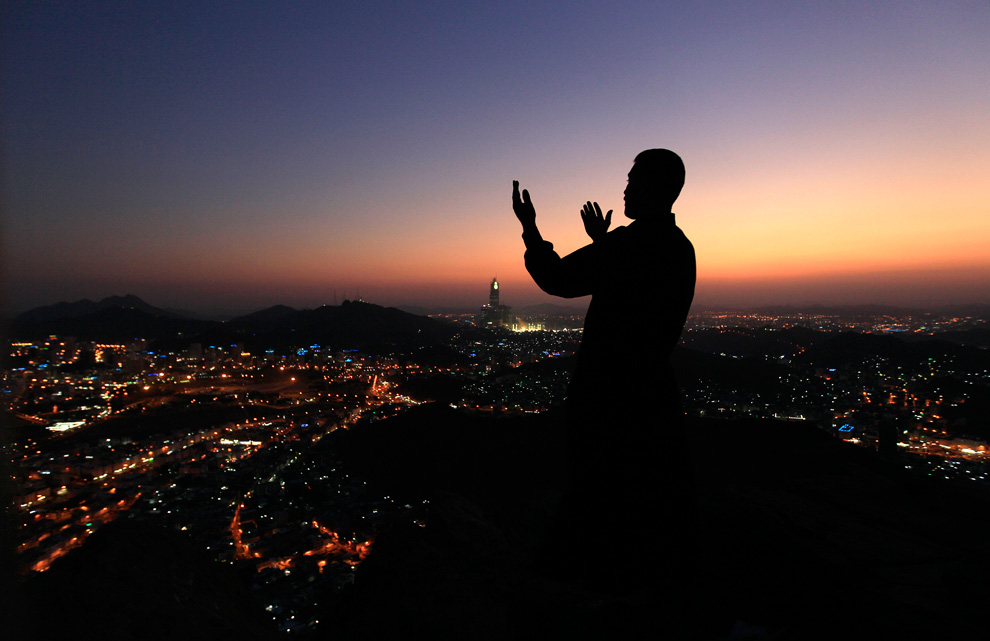
Hajj The Final Thoughts
Prophet Muhammad (s.a.w) performed his farewell pilgrimage on the ninth of Dhul Hijjah, 10 years after Hijrah (migration to Madinah) on the valley of Arafah. It was a sermon so sincere, serene and thought provoking, giving mankind fundamental and guiding principles concerning the rights of humanity whereby life at all levels could be reformed and set right at individual -universal level for all times to come.
This journey is considered as the only pilgrimage which is also known as (Hujat Al-Balagh) where our beloved Prophet (s.a.w) proclaimed the message and decree of Allah (swt). Through this sermon, he imposed on Muslims the apprising duty of (Tableegh) to convey the message of Islam. He preached, informed and advised Muslims on how to perform the rituals (Manasik) of Hajj and had clarified what is forbidden and what is permissible under the sovereignty of Islam. During that day Almighty endowed on His prophet (s.a.w) whereby He revealed the last verse from the noble Quran as Allah (swt) said (interpretation of the meaning):
[Surat al-Ma’idah 5:3]
“On this day I perfected for you your religion and I completed upon you my favour and I bless for you Islam as a religion”
The only way to finish off your journey of Hajj is to finish it off by reading the final sermon of the Prophet Muhammad (s.a.w):
final sermon of the Prophet Muhammad peace be upon him
“O People, lend me an attentive ear, for I know not whether after this year, I shall ever be amongst you again. Therefore, listen to what I am saying to you very carefully and TAKE THESE WORDS TO THOSE WHO COULD NOT BE PRESENT HERE TODAY.
O People, just as you regard this month, this day, this city as Sacred, so regard the life and property of every Muslim as a sacred trust. Return the goods entrusted to you to their rightful owners. Hurt no one so that no one may hurt you. Remember that you will indeed meet your LORD, and that HE will indeed reckon your deeds. ALLAH has forbidden you to take usury (interest), therefore all interest obligation shall henceforth be waived. Your capital, however, is yours to keep. You will neither inflict nor suffer any inequity. Allah has Judged that there shall be no interest and that all the interest due to Abbas ibn ‘Abd’al Muttalib (Prophet’s uncle) shall henceforth be waived…
Beware of Satan, for the safety of your religion. He has lost all hope that he will ever be able to lead you astray in big things, so beware of following him in small things.
O People, it is true that you have certain rights with regard to your women, but they also have rights over you. Remember that you have taken them as your wives only under Allah’s trust and with His permission. If they abide by your right then to them belongs the right to be fed and clothed in kindness. Do treat your women well and be kind to them for they are your partners and committed helpers. And it is your right that they do not make friends with any one of whom you do not approve, as well as never to be unchaste.
O People, listen to me in earnest, worship ALLAH, say your five daily prayers (Salah), fast during the month of Ramadan, and give your wealth in Zakat. Perform Hajj if you can afford to.
All mankind is from Adam and Eve, an Arab has no superiority over a non-Arab nor a non-Arab has any superiority over an Arab; also a white has no superiority over black nor a black has any superiority over white except by piety and good action. Learn that every Muslim is a brother to every Muslim and that the Muslims constitute one brotherhood. Nothing shall be legitimate to a Muslim which belongs to a fellow Muslim unless it was given freely and willingly. Do not, therefore, do injustice to yourselves.
Remember, one day you will appear before ALLAH and answer your deeds. So beware, do not stray from the path of righteousness after I am gone.
O People, NO PROPHET OR APOSTLE WILL COME AFTER ME AND NO NEW FAITH WILL BE BORN. Reason well, therefore, O People, and understand words which I convey to you. I leave behind me two things, the QURAN and my example, the SUNNAH and if you follow these you will never go astray.
All those who listen to me shall pass on my words to others and those to others again; and may the last ones understand my words better than those who listen to me directly. Be my witness, O ALLAH, that I have conveyed your message to your people”.
